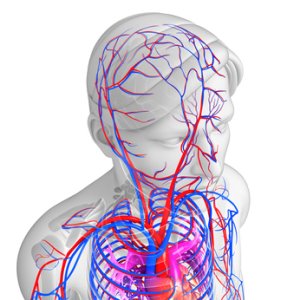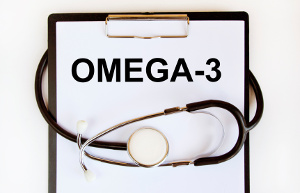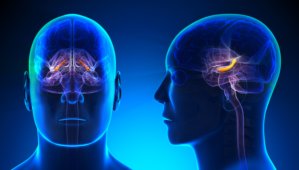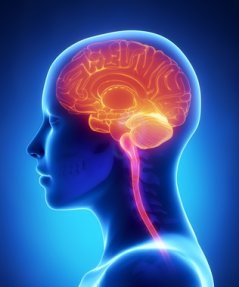- and help prevent dementia, depression, and impairment of your cognitive skills
 People with elevated levels of omega-3 fatty acids in their blood have better circulation in those parts of the brain that handle learning, language, memory, and other cognitive functions, according to a recent report that is published in the Journal of Alzheimer’s Disease. The scientists also observed a link between blood levels of omega-3 and the rate of dementia and depression. They call their study an important discovery that supports earlier studies, which have shown how simple dietary adjustments such as increasing your intake of oily fish or fish oil supplements help preserve mental skills and a healthy mind.
People with elevated levels of omega-3 fatty acids in their blood have better circulation in those parts of the brain that handle learning, language, memory, and other cognitive functions, according to a recent report that is published in the Journal of Alzheimer’s Disease. The scientists also observed a link between blood levels of omega-3 and the rate of dementia and depression. They call their study an important discovery that supports earlier studies, which have shown how simple dietary adjustments such as increasing your intake of oily fish or fish oil supplements help preserve mental skills and a healthy mind.
 After giving birth, the mother’s adaptability and resources are put to the test. Also, the mother’s “baby brain” tends to take over. Unfortunately, many new mothers get the baby blues, and around 10 percent develop an actual postpartum depression that requires immediate attention. It is important to focus on the underlying causes that include the course of the delivery plus hormonal, biological, social, and emotional changes.
After giving birth, the mother’s adaptability and resources are put to the test. Also, the mother’s “baby brain” tends to take over. Unfortunately, many new mothers get the baby blues, and around 10 percent develop an actual postpartum depression that requires immediate attention. It is important to focus on the underlying causes that include the course of the delivery plus hormonal, biological, social, and emotional changes.
 More and more people are affected by depression, and many do not benefit from medical therapy, which may even cause serious side effects. It is already known that magnesium supplementation can relieve symptoms of depression, but science does not fully understand the exact mechanisms, and it is uncertain magnesium levels in the blood can be used to predict the outcome of therapy. A team of scientists from University of Vermont, USA, wanted to study this closer and they managed to find a relation. It is important to remember not to consume too much calcium in relation to magnesium, as this may stress the cells and set the stage for depression and variety of diseases. The question is how much of these two essential nutrients do we need?
More and more people are affected by depression, and many do not benefit from medical therapy, which may even cause serious side effects. It is already known that magnesium supplementation can relieve symptoms of depression, but science does not fully understand the exact mechanisms, and it is uncertain magnesium levels in the blood can be used to predict the outcome of therapy. A team of scientists from University of Vermont, USA, wanted to study this closer and they managed to find a relation. It is important to remember not to consume too much calcium in relation to magnesium, as this may stress the cells and set the stage for depression and variety of diseases. The question is how much of these two essential nutrients do we need?
 Vitamin B12 is involved in the making of red blood cells. Its role in our nervous system is often overlooked. According to a large Irish study of older people that is published in British Journal of Nutrition, there is a link between lacking vitamin B12 and feeling depressed. Depression is a growing problem that comes with a huge human and socioeconomic price tag, which makes this study highly relevant. It is especially older people, public health servants, and politicians that should pay extra attention to vitamin B12 deficiencies and how to prevent them with simple and inexpensive means. It should also be noted that vegetarian and vegan diets, low stomach acid, and diabetes medication can increase the risk of having low levels of vitamin B12.
Vitamin B12 is involved in the making of red blood cells. Its role in our nervous system is often overlooked. According to a large Irish study of older people that is published in British Journal of Nutrition, there is a link between lacking vitamin B12 and feeling depressed. Depression is a growing problem that comes with a huge human and socioeconomic price tag, which makes this study highly relevant. It is especially older people, public health servants, and politicians that should pay extra attention to vitamin B12 deficiencies and how to prevent them with simple and inexpensive means. It should also be noted that vegetarian and vegan diets, low stomach acid, and diabetes medication can increase the risk of having low levels of vitamin B12.
Studies on the effect of fish oil on depression has previously been mixed. For this reason English scientist Julian Martins decided to update our knowledge on this subject. His research shows that the omega-3 fatty acid EPA is more effective against depression than DHA.
 Depression is often caused by brain inflammation, and it looks as if high-dosed supplementation with EPA, a type of omega-3 fatty acids found in fish oil, may help as it reduces depression in patients with elevated inflammation markers in the blood. This was shown in a study that is published in The Journal of Clinical Psychiatry.
Depression is often caused by brain inflammation, and it looks as if high-dosed supplementation with EPA, a type of omega-3 fatty acids found in fish oil, may help as it reduces depression in patients with elevated inflammation markers in the blood. This was shown in a study that is published in The Journal of Clinical Psychiatry.
 Several studies have revealed that B vitaminsstrengthen the nervous system and reduce symptoms of stress. However, very few studies have looked at how the individual B vitamins work. A new placebo-controlled study that is published in the science journal, Human Psychopharmacology, appears to show that high-dosed vitamin B6 boosts the body’s formation of a certain neurotransmitter that blocks the exchange of undesirable impulses between brain cells, and this has a calming effect. In addition, vitamin B6 seems to reduce symptoms of depression.
Several studies have revealed that B vitaminsstrengthen the nervous system and reduce symptoms of stress. However, very few studies have looked at how the individual B vitamins work. A new placebo-controlled study that is published in the science journal, Human Psychopharmacology, appears to show that high-dosed vitamin B6 boosts the body’s formation of a certain neurotransmitter that blocks the exchange of undesirable impulses between brain cells, and this has a calming effect. In addition, vitamin B6 seems to reduce symptoms of depression.
 Scientists from Queensland in Australia have discovered that vitamin D is of vital importance to the structure and health of the brain. Also, deficiencies of the nutrient may lead to dysfunctions and loss of cognitive skills plus depression and schizophrenia. More than one billion people worldwide are believed to lack vitamin D. This may have widespread consequences for their health and may even be linked to the huge increase in mental illnesses.
Scientists from Queensland in Australia have discovered that vitamin D is of vital importance to the structure and health of the brain. Also, deficiencies of the nutrient may lead to dysfunctions and loss of cognitive skills plus depression and schizophrenia. More than one billion people worldwide are believed to lack vitamin D. This may have widespread consequences for their health and may even be linked to the huge increase in mental illnesses.
 An estimated 350 million people worldwide suffer from depression, a disease with huge economic and human costs. Not everyone benefits from the traditional medical treatment, which can even cause various side effects, so there is every reason in the world to aim for more prevention and better therapies. A new study that is published in PLoS One shows that magnesium supplements are effective as an adjuvant in mild or moderate depression. The researchers have also discovered which biochemical effect magnesium has on mood.
An estimated 350 million people worldwide suffer from depression, a disease with huge economic and human costs. Not everyone benefits from the traditional medical treatment, which can even cause various side effects, so there is every reason in the world to aim for more prevention and better therapies. A new study that is published in PLoS One shows that magnesium supplements are effective as an adjuvant in mild or moderate depression. The researchers have also discovered which biochemical effect magnesium has on mood.
 Depression is one of the largest health burdens worldwide. Although depression can be caused by a number of different things, a new Taiwanese study published in Nutrients suggests that having high blood levels of magnesium is linked to fewer signs of depression. The scientists describe how magnesium supports different enzymatic processes that are involved in the nervous system, the hormone system, and in brain receptors with a key role in depression. Unfortunately, there are things that deplete our magnesium levels such as stress, poor diets, and the use of different types of medicine. To make matters worse, having less magnesium impairs our ability to utilize vitamin D that is important for our mood.
Depression is one of the largest health burdens worldwide. Although depression can be caused by a number of different things, a new Taiwanese study published in Nutrients suggests that having high blood levels of magnesium is linked to fewer signs of depression. The scientists describe how magnesium supports different enzymatic processes that are involved in the nervous system, the hormone system, and in brain receptors with a key role in depression. Unfortunately, there are things that deplete our magnesium levels such as stress, poor diets, and the use of different types of medicine. To make matters worse, having less magnesium impairs our ability to utilize vitamin D that is important for our mood.
 Magnesium takes part in over 300 different enzyme processes, some of which are relevant for the nervous system. Magnesium deficiencies are common, and there is a link to the increased prevalence of subjective anxiety and stress. Researchers from the University of Leeds in Great Britain have reviewed a number of studies that show how supplementation with magnesium may help in cases of mild anxiety, stress, and depression. Magnesium appears to be a precondition of a healthy and sturdy nervous system, and getting enough of this nutrient is therefore important for preventing these conditions.
Magnesium takes part in over 300 different enzyme processes, some of which are relevant for the nervous system. Magnesium deficiencies are common, and there is a link to the increased prevalence of subjective anxiety and stress. Researchers from the University of Leeds in Great Britain have reviewed a number of studies that show how supplementation with magnesium may help in cases of mild anxiety, stress, and depression. Magnesium appears to be a precondition of a healthy and sturdy nervous system, and getting enough of this nutrient is therefore important for preventing these conditions.
- which may be caused by lack of melatonin and the presence of toxic substances in the brain
 Night owls stay up late in the evening and get up late in the morning, and they risk depression, according to a new study. In fact, there seems to be a link between the increasing number of people with disturbed 24-hour rhythm who expose themselves to blue light from computer screens and other devices, and who become depressed. Lack of sleep at night and low levels of the hormone melatonin are a burden to the brain and nervous system in several different ways.
Night owls stay up late in the evening and get up late in the morning, and they risk depression, according to a new study. In fact, there seems to be a link between the increasing number of people with disturbed 24-hour rhythm who expose themselves to blue light from computer screens and other devices, and who become depressed. Lack of sleep at night and low levels of the hormone melatonin are a burden to the brain and nervous system in several different ways.
 A growing number of people are affected by depression and anxiety, and there are quite a few who do not benefit from their medicine, which in some cases may even cause side effects. Earlier studies show that lack of omega-3, the essential fatty acids found primarily in oily fish, play a major role in depression. The question is how important is omega-3 for those, who already receive therapy for their depression, and what about those in therapy for anxiety? A group of Dutch scientists set out to answer this question. A thing to make a note of is that it is the two omega-3 fatty acids, EPA and DHA, which have a direct influence on our mood, and when supplementing, it may take some time before the effect is optimal.
A growing number of people are affected by depression and anxiety, and there are quite a few who do not benefit from their medicine, which in some cases may even cause side effects. Earlier studies show that lack of omega-3, the essential fatty acids found primarily in oily fish, play a major role in depression. The question is how important is omega-3 for those, who already receive therapy for their depression, and what about those in therapy for anxiety? A group of Dutch scientists set out to answer this question. A thing to make a note of is that it is the two omega-3 fatty acids, EPA and DHA, which have a direct influence on our mood, and when supplementing, it may take some time before the effect is optimal.
 After a COVID-19 infection many people experience chronic symptoms such as fatigue, muscle pain, depression, and sleep disturbances. According to a study that is published in Clinical and Experimental Medicine, supplementing with Q10and alpha-lipoic acid may help against tiredness and certain other symptoms. The authors describe how Q10 and alpha-lipoic acid support the cellular energy turnover in different ways and serve as antioxidants that protect cells against oxidative stress and cellular damage.
After a COVID-19 infection many people experience chronic symptoms such as fatigue, muscle pain, depression, and sleep disturbances. According to a study that is published in Clinical and Experimental Medicine, supplementing with Q10and alpha-lipoic acid may help against tiredness and certain other symptoms. The authors describe how Q10 and alpha-lipoic acid support the cellular energy turnover in different ways and serve as antioxidants that protect cells against oxidative stress and cellular damage.
 Several studies have shown a direct link between depression and lack of vitamin D, both of which are common problems. Vitamin D has numerous functions in the brain and nervous system and it helps counteract local inflammation that is often seen in connection with depression. According to a new Finish meta-analysis, high-dosed vitamin D supplementation can even ameliorate symptoms of depression. The question is how to optimize blood levels of the nutrient in order to prevent the disease.
Several studies have shown a direct link between depression and lack of vitamin D, both of which are common problems. Vitamin D has numerous functions in the brain and nervous system and it helps counteract local inflammation that is often seen in connection with depression. According to a new Finish meta-analysis, high-dosed vitamin D supplementation can even ameliorate symptoms of depression. The question is how to optimize blood levels of the nutrient in order to prevent the disease.
 Recent studies reveal that vitamin D and omega-3 fatty acids are able to prevent and ameliorate a number of neurological ailments such as depression, ADHD, bipolar disorder, autism, and schizophrenia. There is evidence suggesting that vitamin D and omega-3 fatty acids work by controlling the synthesis of serotonin in the brain. The listed neurological conditions are all characterized by defects in the body’s synthesis of this important neurotransmitter. It is therefore vital to get plenty of sunshine, vitamin D, and omega-3 fatty acids, as widespread deficiencies in all three most likely contribute to the increasing rate of different neurological disorders.
Recent studies reveal that vitamin D and omega-3 fatty acids are able to prevent and ameliorate a number of neurological ailments such as depression, ADHD, bipolar disorder, autism, and schizophrenia. There is evidence suggesting that vitamin D and omega-3 fatty acids work by controlling the synthesis of serotonin in the brain. The listed neurological conditions are all characterized by defects in the body’s synthesis of this important neurotransmitter. It is therefore vital to get plenty of sunshine, vitamin D, and omega-3 fatty acids, as widespread deficiencies in all three most likely contribute to the increasing rate of different neurological disorders.
 Vitamin C is extremely important for the brain’s blood vessels, nerve cells, neurotransmitters, and connective tissue. An estimated 10 percent of the adult population is vitamin C deficient without specific symptoms. According to a scientific article in the Danish journal Aktuel Videnskab, vitamin C deficiency during pregnancy may harm brain development in the fetus.
Vitamin C is extremely important for the brain’s blood vessels, nerve cells, neurotransmitters, and connective tissue. An estimated 10 percent of the adult population is vitamin C deficient without specific symptoms. According to a scientific article in the Danish journal Aktuel Videnskab, vitamin C deficiency during pregnancy may harm brain development in the fetus.
 People with elevated levels of omega-3 fatty acids in their blood have better circulation in those parts of the brain that handle learning, language, memory, and other cognitive functions, according to a recent report that is published in the Journal of Alzheimer’s Disease. The scientists also observed a link between blood levels of omega-3 and the rate of dementia and depression. They call their study an important discovery that supports earlier studies, which have shown how simple dietary adjustments such as increasing your intake of oily fish or fish oil supplements help preserve mental skills and a healthy mind.
People with elevated levels of omega-3 fatty acids in their blood have better circulation in those parts of the brain that handle learning, language, memory, and other cognitive functions, according to a recent report that is published in the Journal of Alzheimer’s Disease. The scientists also observed a link between blood levels of omega-3 and the rate of dementia and depression. They call their study an important discovery that supports earlier studies, which have shown how simple dietary adjustments such as increasing your intake of oily fish or fish oil supplements help preserve mental skills and a healthy mind.











 After giving birth, the mother’s adaptability and resources are put to the test. Also, the mother’s “baby brain” tends to take over. Unfortunately, many new mothers get the baby blues, and around 10 percent develop an actual postpartum depression that requires immediate attention. It is important to focus on the underlying causes that include the course of the delivery plus hormonal, biological, social, and emotional changes.
After giving birth, the mother’s adaptability and resources are put to the test. Also, the mother’s “baby brain” tends to take over. Unfortunately, many new mothers get the baby blues, and around 10 percent develop an actual postpartum depression that requires immediate attention. It is important to focus on the underlying causes that include the course of the delivery plus hormonal, biological, social, and emotional changes. More and more people are affected by depression, and many do not benefit from medical therapy, which may even cause serious side effects. It is already known that
More and more people are affected by depression, and many do not benefit from medical therapy, which may even cause serious side effects. It is already known that 
 Depression is often caused by brain inflammation, and it looks as if high-dosed supplementation with EPA, a type of
Depression is often caused by brain inflammation, and it looks as if high-dosed supplementation with EPA, a type of  Several studies have revealed that
Several studies have revealed that  Scientists from Queensland in Australia have discovered that
Scientists from Queensland in Australia have discovered that  An estimated 350 million people worldwide suffer from depression, a disease with huge economic and human costs. Not everyone benefits from the traditional medical treatment, which can even cause various side effects, so there is every reason in the world to aim for more prevention and better therapies. A new study that is published in PLoS One shows that
An estimated 350 million people worldwide suffer from depression, a disease with huge economic and human costs. Not everyone benefits from the traditional medical treatment, which can even cause various side effects, so there is every reason in the world to aim for more prevention and better therapies. A new study that is published in PLoS One shows that  Depression is one of the largest health burdens worldwide. Although depression can be caused by a number of different things, a new Taiwanese study published in Nutrients suggests that having high blood levels of
Depression is one of the largest health burdens worldwide. Although depression can be caused by a number of different things, a new Taiwanese study published in Nutrients suggests that having high blood levels of 
 Night owls stay up late in the evening and get up late in the morning, and they risk depression, according to a new study. In fact, there seems to be a link between the increasing number of people with disturbed 24-hour rhythm who expose themselves to blue light from computer screens and other devices, and who become depressed. Lack of sleep at night and low levels of the hormone melatonin are a burden to the brain and nervous system in several different ways.
Night owls stay up late in the evening and get up late in the morning, and they risk depression, according to a new study. In fact, there seems to be a link between the increasing number of people with disturbed 24-hour rhythm who expose themselves to blue light from computer screens and other devices, and who become depressed. Lack of sleep at night and low levels of the hormone melatonin are a burden to the brain and nervous system in several different ways. A growing number of people are affected by depression and anxiety, and there are quite a few who do not benefit from their medicine, which in some cases may even cause side effects. Earlier studies show that lack of
A growing number of people are affected by depression and anxiety, and there are quite a few who do not benefit from their medicine, which in some cases may even cause side effects. Earlier studies show that lack of  After a COVID-19 infection many people experience chronic symptoms such as fatigue, muscle pain, depression, and sleep disturbances. According to a study that is published in Clinical and Experimental Medicine, supplementing with
After a COVID-19 infection many people experience chronic symptoms such as fatigue, muscle pain, depression, and sleep disturbances. According to a study that is published in Clinical and Experimental Medicine, supplementing with  Several studies have shown a direct link between depression and lack of
Several studies have shown a direct link between depression and lack of  Recent studies reveal that
Recent studies reveal that 
 "After about one week of taking the Q10 supplement I could feel a huge difference," says 23-year old Alan Piccini, who has been suffering from extreme fatigue and muscle aches ever since he was a child.
"After about one week of taking the Q10 supplement I could feel a huge difference," says 23-year old Alan Piccini, who has been suffering from extreme fatigue and muscle aches ever since he was a child. “Taking capsules with co-enzyme Q10 has freed me of the severe side effects of my cholesterol lowering medicine,” Mrs Franken explains.
“Taking capsules with co-enzyme Q10 has freed me of the severe side effects of my cholesterol lowering medicine,” Mrs Franken explains.